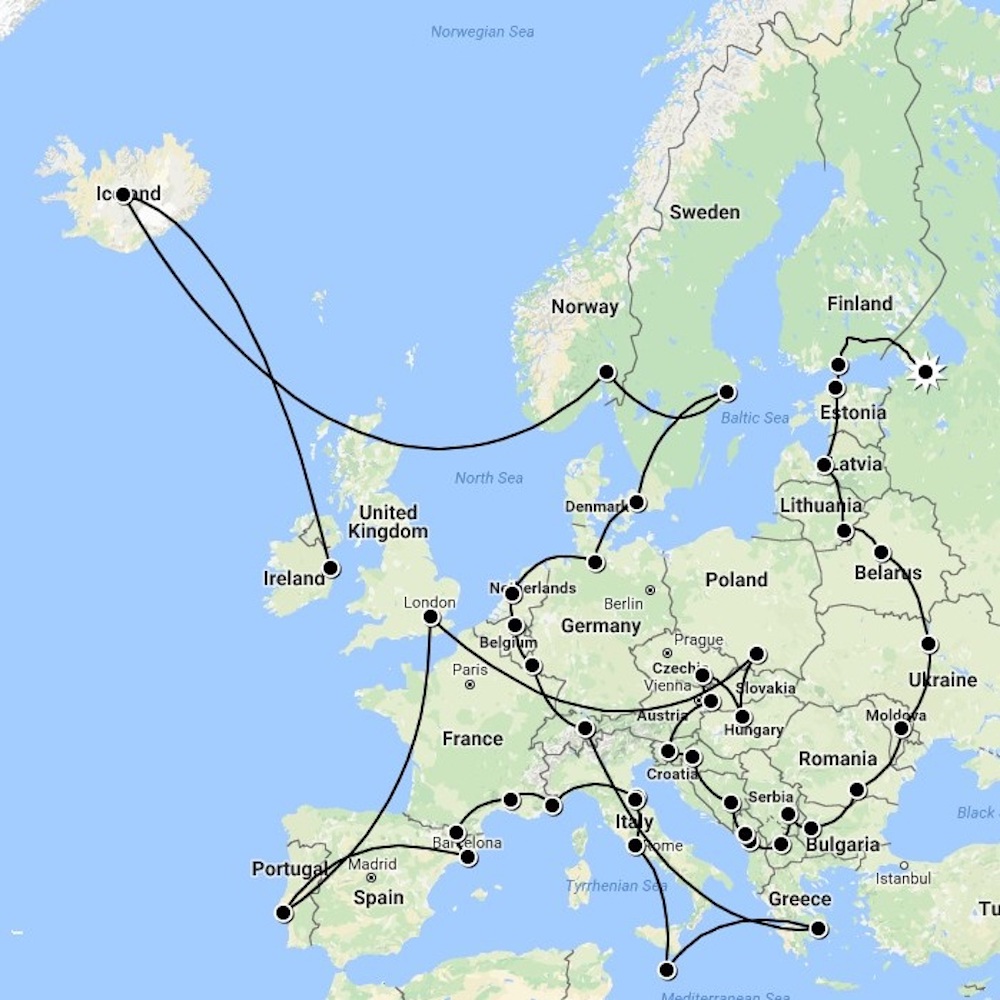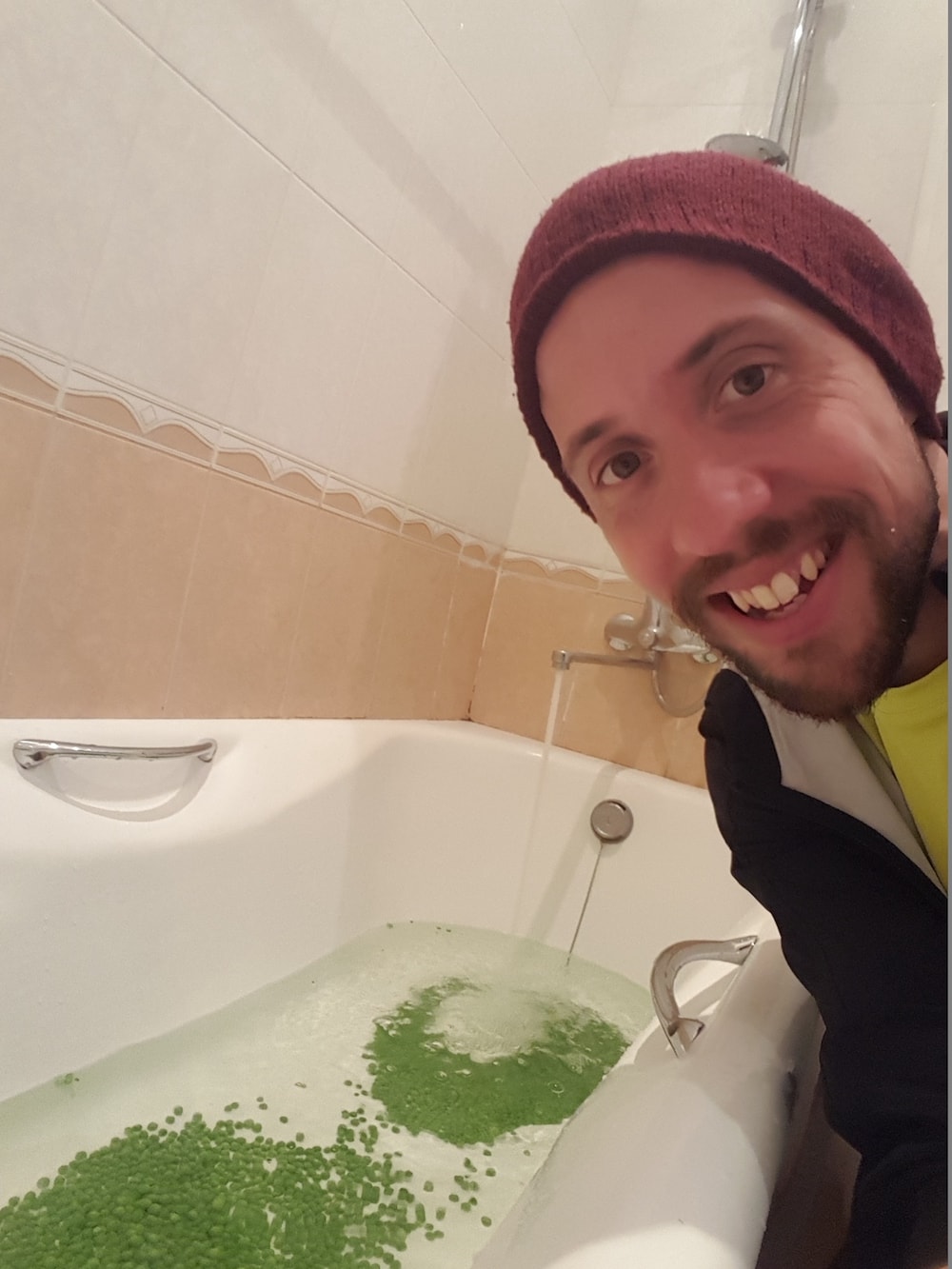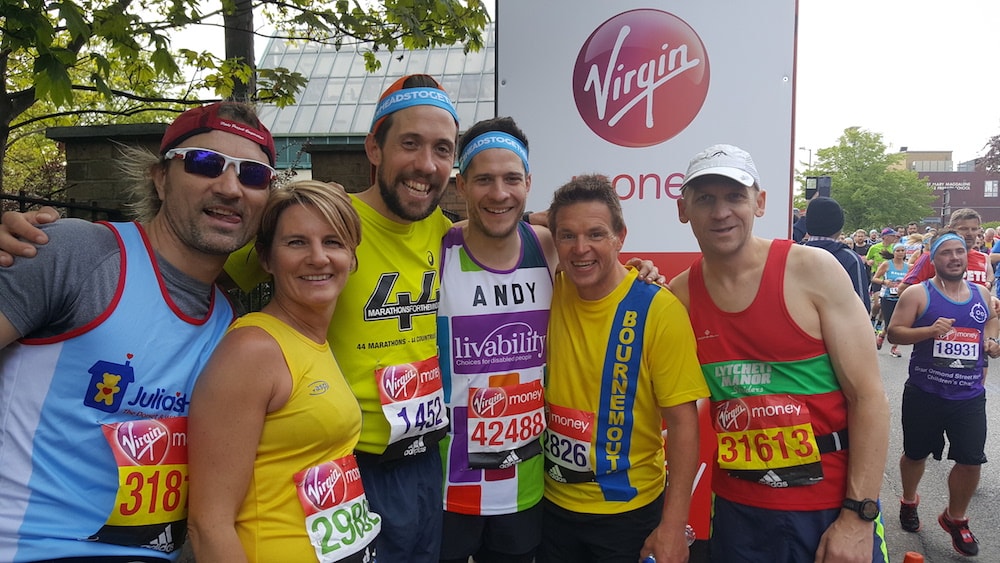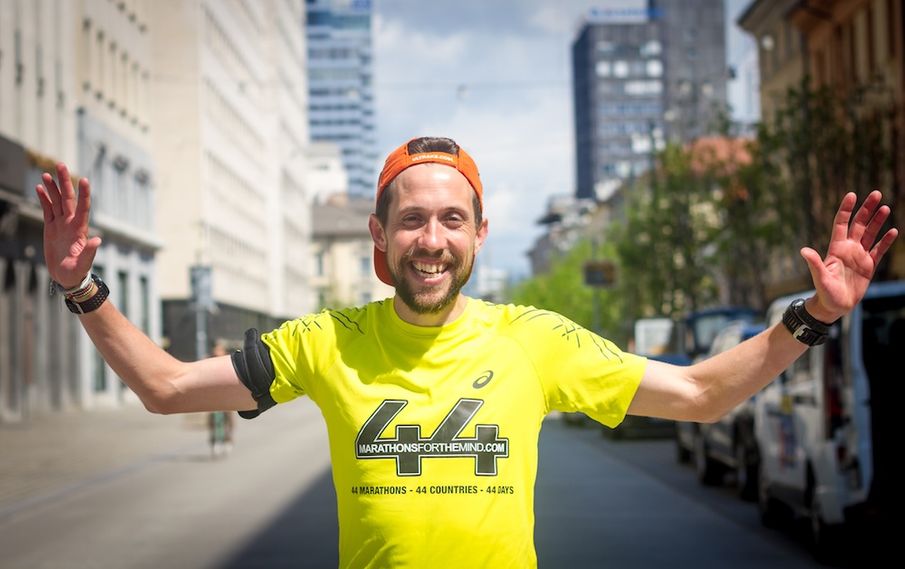Peter Thompson ran himself into the ground, losing track of what was important to him. But through challenging himself, he not only rediscovered his passion for the sport, but he raised phenomenal awareness and funds for mental health charities

Peter's route
All I had in front of me was a list of 44 countries, a scruffy old map of Europe and a disproportionate amount of optimism, but I had an idea. What if I could do something no one had done before? What if I could run a marathon in every country in Europe in consecutive days?
Over the past 10 years, running had become everything to me. It was my drive, my passion, my life. Everything I did revolved around running. What time I ate, how long I slept, where and when I was going to fit in the 100 miles I was running each week around work, family and my girlfriend.
In October 2015, I crossed the finish line of the Amsterdam marathon in a time of 2:25:32. I was the first British finisher by about five minutes, and 25th in a field of tens of thousands. I was jumping for joy. However, this level of commitment and focus was becoming all consuming. Something had to give – and it did.
Three months on and things were very different. I had decided to stop running. I’d split up with my girlfriend, my motivation for the sport I loved had gone, and with them both my dreams and what I thought was my future. I blamed running. The focus I’d placed on chasing a number had been focus I’d taken off things that mattered more.
Most of us have moments in life where we feel lost, so far from the person we want to be. And we have no idea how to get that person back.
This level of commitment and focus was becoming all consuming. Something had to give – and it did
So what do you do – talk to family and friends? Do you seek professional help? In hindsight, I should have done all of these things. Instead, I flew to Uganda to volunteer at an orphanage.
The orphanage was called the Raise Uganda Now Academy. Or, as I found out when I got there, abbreviated to the RUN Academy. Only I could go all the way to Uganda to get away from running and end up at the RUN Academy!
The trip was supposed to last two weeks, but five days in I was crying in the manager of the orphanage’s arms and feeling worse than ever. I needed to find another way to deal with things. When I returned, it felt like I was on the starting line of a new race. A new challenge to look at my life and make a change.
In my time off from running, I realised just how much it had impacted my mental health and wellbeing. I’m someone who finds it very hard to sit still. I need to be active, working towards a goal. I decided I wanted to use running to make a difference. I wanted to re-find my focus and most importantly, I wanted to be happy.

Peter Thompson
I was also acutely aware I didn’t want running to return to being an obsession about speed and times. I wanted to rediscover why I started running in the first place. I wanted it to be fun again. So I needed a challenge…
Maybe I could run across England? Maybe I could run around Europe? That had a nice ring to it. Maybe I could run a marathon in every country in Europe in consecutive days?
According to the United Nations, there were 44 countries. I spent the next few weeks scanning the internet for train timetables, visa requirements and drawing up potential routes. I would think I had cracked it only to hit a problem and be back to square one. Everything had a knock-on effect. I was stuck, I was lost.
But, this time I did the right thing – I spoke to a friend. Together, Bill and I spent the next month batting ideas back and forth and came up with a route. It still scares me a bit when I look at it!
Starting in Russia, I would run through Eastern Europe, the Balkans, before returning to the UK to run the London Marathon. Then it was back through western to southern Europe, through Scandinavia, finishing 44 days later in Ireland. The route would be 95% public transport, requiring 22 trains, 12 planes, five buses, four cars and one ferry between Finland and Estonia. On paper this could work, but the reality was a complete unknown.
I enlisted the help of others – my physio, my brother, my running club. Everyone wanted to help. I was quickly learning that surrounding ourselves with supportive people is key to achieving a positive and healthy mindset. It’s an old cliché, but together we are stronger.
Maybe asking for support showed that I was starting to change. Or perhaps that I found it easier to talk about a physical or logistical problem, than I did about my mental health.
We don’t need to run marathons or scale mountains to make a difference to somebody’s life
Mental health is an important issue in society and the cause I wanted “Marathons for the Mind” to support. I know many people who have serious mental health issues. Some have tried to take their own lives and others battle through with determination and courage that I admire greatly.
I’ve seen people at their lowest, I’ve seen the stigma they face and the lack of support when they need it most.
The mental health focus started for these people. But, I soon realised I was questioning my own mental health. I feel on top of the world one day and want to hide away the next. I always thought this was normal and never spoke about it.
Having seen others with greater mental health needs than me, I thought it would be disrespectful to talk about my mental health. But, I now realise it’s not a comparison. We all have mental health just like physical health and there’s many levels within that. By talking, we help ourselves, others and we help to end the stigma.

Peter with friends
So, I set off on my journey and the longest and hardest 44 days of my life. I encountered lost luggage, bus cancellations, plane delays, sleep deprivation, snow, injury and even narrowly avoiding being arrested at Athens airport.
I have countless stories of people supporting my journey by giving their time, effort and hospitality, some not being able to speak a word of English. But 44 days later, I made it to that finish line in Dublin.
I visited every country in Europe, covering over 11,000 miles by various means of transport. I ran over 1,100 miles – about the distance of running from here to Rome. I gained a much better understanding of my own mental health and the need to let others in. Most importantly, I raised over £19,000 for the incredible charities Mind and Livability, and have hopefully shown that we can all make a difference when it comes to mental health.
When I returned, an interviewer asked whether I found it easier to run across Europe or open up about my own mental health. At that moment, I didn’t know what to say. If they’d asked me that when I was crying in the corner of a Budapest bus station, the answer would have been simple. But the fact I had to even think about it shows just how hard it can be to talk openly about our feelings.
If I’m honest, I still don’t 100% know the answer, but I do know that neither of those things were easy, and I feel as proud of being able to talk more openly about my mental health as anything I’ve achieved physically. We don’t need to run marathons or scale mountains to make a difference to somebody’s life, and that openness to talk, seek help or listen without judgement is something that we’re all capable of achieving. I also promise that it comes with just as great a reward as crossing any finish line.
To donate or find out more about “Marathons for the Mind” and Peter’s future challenges, visit marathonsforthemind.com
Peter’s story is one of strength and courage. Although it was, literally, a tough road, facing his feelings was a real turning point for him. As he said, it wasn’t easy, but we forget it’s often harder to try to ignore a problem than it is to deal with it. Peter’s used what he once saw as the problem to find a solution, and even go on to help others. As Peter discovered, accepting support doesn’t make us weak, instead it allows us to be strong!


Comments